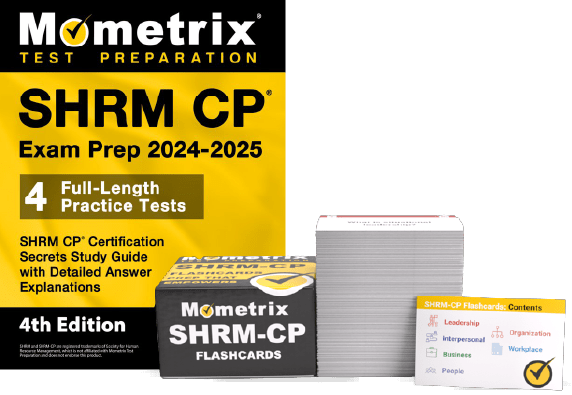If you need help studying for the SHRM-CP® exam or just want some more information about what the test is like, you’ve come to the right place.
Click below to take a free SHRM-CP practice test!
How to Register
SHRM-CP Scores
Retaking the Exam
Online Prep Course
What Test-Takers Are Saying
FAQs
What’s on the Exam?
First, let’s talk about the questions on the exam. There are 134 multiple-choice questions total, but only 110 of the questions will count toward your score. Why is that?
The 24 unscored questions on the SHRM-CP exam are called “field-test” questions. These are added to the exam to determine if they’re good enough questions to add to future versions of the test.
The trick is that you won’t have any way of knowing which questions are scored and which ones are field-test questions. They will appear just like the scored questions throughout the test.
There are two different types of multiple-choice questions to look out for: knowledge and situational judgment.
There are two types of knowledge-based questions: HR-specific and foundational. The HR-specific questions are related to topics found in 14 HR functional areas, while the foundational questions involve concepts from 9 behavioral competencies.
Situational Judgment
Situational judgment questions are designed to assess your decision-making abilities. You’ll be given a work-related scenario and asked to select the most effective strategy from several options to resolve any conflicts and address the issues presented.
SHRM-CP Outline
The questions are grouped into two types of competencies: behavioral and technical.
Let’s take a closer look at how the questions are categorized.
BEHAVIORAL COMPETENCIES
9 competencies
Competency 2: Ethical Practice
Competency 3: Diversity, Equity, and Inclusion
Interpersonal Cluster
Competency 2: Communication
Competency 3: Global Mindset
Business Cluster
Competency 2: Consultation
Competency 3: Analytical Aptitude
TECHNICAL COMPETENCY
14 functional areas
Functional Area 2: Talent Acquisition
Functional Area 3: Employee Engagement and Retention
Functional Area 4: Learning and Development
Functional Area 5: Total Rewards
Domain 2: Organizational Knowledge
Functional Area 2: Organizational Effectiveness and Development
Functional Area 3: Workforce Management
Functional Area 4: Employee and Labor Relations
Functional Area 5: Technology Management
Domain 3: Workplace Knowledge
Functional Area 2: Risk Management
Functional Area 3: Corporate Social Responsibility
Functional Area 4: US Employment Law and Regulations
How to Register
To get started, you’ll need to submit an application on SHRM’s website.
SHRM-CP Scores
The SHRM-CP test is scored using a scaled scoring method. Here’s how it works:
For every question you answer correctly, you get one point added to your raw score. At the end of the test, your final raw score will be converted to a scaled score. This scaled score will range somewhere between 120 and 200.
The reason your raw score is converted to a scaled score is because everyone who takes the SHRM-CP test is given a slightly different set of questions. Since everyone has a different arrangement of questions, and because some questions are harder than others, converting your raw score to a scaled score ensures a more even playing field.
Retaking the Exam
If you didn’t get a passing score on your first try, that’s okay! You can retake the test during the next available testing window.
Keep in mind that you will have to pay the full testing fee every time you retake the test.
Online SHRM-CP Prep Course
If you want to be fully prepared, Mometrix offers an online SHRM-CP prep course. The course is designed to provide you with any and every resource you might want while studying. The SHRM-CP course includes:
The SHRM-CP prep course is designed to help any learner get everything they need to prepare for their SHRM-CP exam. Click below to check it out!
What Test-Takers Are Saying
Don’t just take our word for it! See what real test-takers are saying about the SHRM-CP exam:
“A lot of the situational judgement questions were about misconduct from management regarding conflict of interests or nepotism in hiring, as well as a lot of questions about employees using “illicit substances.” Also, there were LOTS of globalization questions—I cannot stress this enough.”

NoMoreWhiteFerraris
“My recommendations when taking the test: Use the cross-out method (biggest help for me), highlight important details, flag the ones you think might be incorrect so you can go back to them later, and take that break in between. Even if it’s to drink some water.”

Michelle Proffitt
“SHRM wants to see HR as a strategic partner at the highest levels of the org. Answer questions with this philosophy in mind. SHRM also loves the HRBP model. Imagine yourself as an HRBP in the situational judgment questions, or how an HRBP would handle it.”

theexterminat
FAQs
What does SHRM-CP stand for?
SHRM-CP stands for Society for Human Resource Management – Certified Professional.
How long is the SHRM-CP exam?
The test is timed at 3 hours and 40 minutes.
How many questions are on the SHRM-CP exam?
The exam contains 134 multiple-choice questions.
What is the passing score for the SHRM-CP exam?
The minimum score you need to pass is 200.
SHRM and SHRM-CP are registered trademarks of Society for Human Resource Management, which is not affiliated with Mometrix Test Preparation and does not endorse this page.



 SHRM-CP Online Course
SHRM-CP Online Course SHRM-CP Study Guide
SHRM-CP Study Guide SHRM-CP Flashcards
SHRM-CP Flashcards

